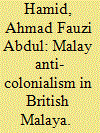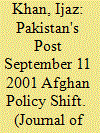|
|
|
Sort Order |
|
|
|
Items / Page
|
|
|
|
|
|
|
| Srl | Item |
| 1 |
ID:
079478


|
|
|
|
|
| Publication |
2007.
|
| Summary/Abstract |
We argue a case for a `revisioning' of the education policy-implementation nexus in the South African higher education sector. It is proposed that the well-meaning idealism expressed in policy pronouncements is necessarily subject to a host of mediations, national and international, which have a mutative effect on the original intent. This understanding of policy, as `policy pragmatism', is used to understand the discourse in current South African higher education, which although very `efficiency' driven, retains considerable access elements. The article describes how the initial policy intention of `unfettered' access transmutes to a pragmatic, cautious and guided right of entry. Thus, while initial policy propositions are contained in policy, they are not as overtly discernible as would be anticipated
|
|
|
|
|
|
|
|
|
|
|
|
|
|
|
|
| 2 |
ID:
079477


|
|
|
|
|
| Publication |
2007.
|
| Summary/Abstract |
The debate which arose between the ruling United Malays National Organization (UMNO) and the opposition Democratic Action Party (DAP) in early September 2005, concerning the history of Malaysia's independence movement, necessitates a re-appraisal of the organizations and personalities involved. This article re-assesses the period and actors involved in bringing to fruition Malaysian independence. By utilizing mainly authoritative secondary sources, the reconstructed history belies the argument of the ruling elites that they inherit the mantle of `real independence fighters' from their political ancestors. Although the sources are readily available in Malaysian libraries, the truth contained in them has eluded the general public. Thus, to lay people, political history in Malaysia has been what ruling politicians tell them and what they find in school textbooks that, in any case, have been approved by the powers that be. This article reveals that pre-independence Malaysian history is replete with contradictions and paradoxes which may transform perceptions of who were and were not independence heroes.
|
|
|
|
|
|
|
|
|
|
|
|
|
|
|
|
| 3 |
ID:
079481


|
|
|
|
|
| Publication |
2007.
|
| Summary/Abstract |
Pakistan had supported the Taliban until September 11 2001, which had gradually alienated the whole region surrounding Pakistan and Afghanistan. After September 11 2001, US-led international military action brought a change in Afghanistan that brought to power forces inimical to Pakistan and supported by the rest of the countries of the region. Pakistan minimized the loss it felt by withdrawing support for the Taliban in the wake of 9/11 and becoming an ally in the `War against Terrorism', with the result that the USA has played a role in stopping the total regional isolation of Pakistan. Pakistan's support for the War on Terror has encouraged a peace process between India and Pakistan. But for Pakistan's decision to realign itself, the regional geopolitical map would have been totally different
|
|
|
|
|
|
|
|
|
|
|
|
|
|
|
|
| 4 |
ID:
079479


|
|
|
|
|
| Publication |
2007.
|
| Summary/Abstract |
In this article we draw upon religious sermons, poetry and first-person accounts to show how rural Sri Lankans used localized meanings of security and sacrifice to mobilize against a project of national development. Using Victor Turner's concept of social drama and the idea that state officials and citizens relate as audiences of each others' actions, we bring the methodological lens of performance to the study of citizenship, development, and legitimacy. The authors find that people's attempt to transform everyday meaning into legitimate meaning forms a profound kernel in the process of making of state-society relations
|
|
|
|
|
|
|
|
|
|
|
|
|
|
|
|
| 5 |
ID:
079480


|
|
|
|
|
| Publication |
2007.
|
| Summary/Abstract |
This article argues that a major aim of the Uruguay Round of GATT was to strengthen its dispute settlement procedures and such efforts resulted in bringing about significant improvements in the WTO dispute settlement system. It upholds the right of initiating a panel process by a complaining government and thus prevents blocking at that stage. It also establishes strict timetables for processing disputes and makes all decisions binding unless the DSB votes unanimously to overrule them. If the defendants fail to comply, the WTO can authorize the complainant to impose retaliatory trade sanctions. However, the system is not without weaknesses as the recommendations of the DSB are not implemented promptly and it is still reliant in important respects on the consent and initiative of the parties to the dispute. Although provisions on dispute settlement are generally seen as positive by the developing countries, including Pakistan, many face the challenge of finding the financial, as well as human, resources to participate in the WTO's dispute settlement proceedings. Securing compliance from a defaulting country, especially if it is a developed country, to the dispute settlement of the WTO also remains a major problem. The article concludes that in a general analysis, the dispute settlement system of WTO has been used by both developed and developing countries, despite having some procedural and functional weaknesses mainly due to the lack of a mechanism at the WTO to implement its decisions
|
|
|
|
|
|
|
|
|
|
|
|
|
|
|
|
|
|
|
|
|